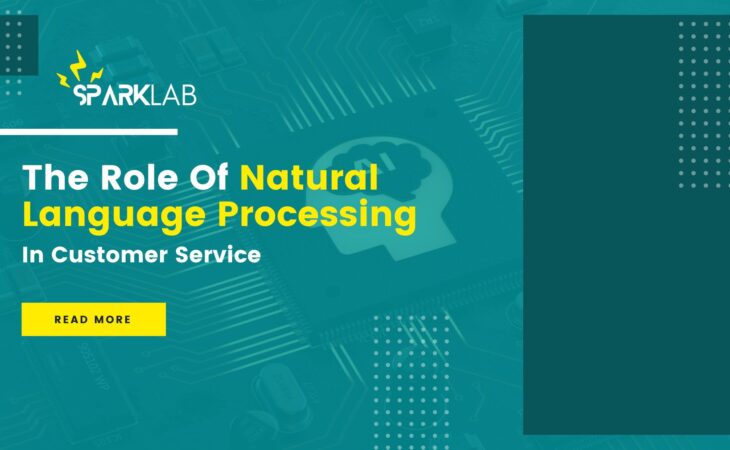
Companies in today’s digital era are continuously working to improve their customer service experiences.
With the advancement of technology, businesses have been able to provide more efficient, effective, and personalized customer service, which has become a vital component of any organization’s success. Natural Language Processing (NLP) is one such widely used technique.
Natural Language Processing (NLP) is a branch of Artificial Intelligence (AI) that studies the interaction between computers and human language. NLP enables computers to perceive, interpret, and generate human language, making it a crucial tool for customer support. Companies may use NLP to automate and streamline their customer service procedures, making them faster and more efficient than ever before.
In this article, we will explore the role of Natural Language Processing in customer service, its benefits, and the future of this technology.
Natural Language Processing involves complex algorithms that are designed to understand and interpret human language. These algorithms are based on machine learning models that use statistical analysis to identify patterns in language. NLP algorithms can analyze text, speech, and even visual data such as images and videos to extract meaningful information.
The first step in NLP is to pre-conditioning the data. This involves cleaning and formatting the data to make it easier for the algorithms to analyze. After preprocessing, the data is passed through various NLP models that extract different types of information. For example, one model might extract the sentiment of the text, while another might extract the intent behind the text.
NLP models use different techniques to extract information, such as named entity recognition, sentiment analysis, and part-of-speech tagging. These techniques enable NLP models to identify entities such as people, places, and organizations in the text, determine the sentiment of the text (positive, negative, or neutral), and identify the part of speech of each word in the text.
Virtual assistants and chatbots are becoming more and more common in customer service. These solutions employ NLP to comprehend consumer inquiries and deliver pertinent answers. Chatbots can answer frequently asked questions, provide product recommendations, and even complete transactions. Virtual assistants, on the other hand, can handle more complex queries and provide personalized solutions to customers.
Sentiment analysis is the process of identifying the sentiment of a piece of text. NLP algorithms can analyze customer feedback and determine whether it is positive, negative, or neutral. This enables companies to understand their customers’ opinions and make informed decisions.
In addition, NLP algorithms can be utilized to analyze client feedback. By analyzing customer feedback, companies can identify common complaints, areas for improvement, and potential opportunities. This enables companies to improve their products and services and provide a better customer experience.
NLP algorithms can also be used to classify emails based on their content. This enables companies to prioritize emails based on their importance and respond to them accordingly. For example, urgent emails can be prioritized and responded to immediately, while non-urgent emails can be responded to at a later time.
One of the biggest advantages of using NLP in customer service is that it enables companies to provide 24/7 availability. Chatbots and virtual assistants can handle customer queries at any time, without the need for human intervention. This ensures that customers can receive help whenever they need it.
NLP algorithms can analyze customer queries and provide relevant responses in real time. This enables companies to provide faster response times, which can improve customer satisfaction and loyalty.
NLP algorithms can also be used to personalize customer experiences. By analyzing customer data, NLP algorithms can provide personalized recommendations and solutions to customers. This can improve customer satisfaction and loyalty, as customers feel valued and understood.
Using NLP in customer service can also lead to cost savings. Chatbots and virtual assistants can handle a large volume of queries, reducing the need for human agents. This can lead to significant cost savings for companies, as they can reduce their staffing needs and improve operational efficiency.
NLP algorithms can also be easily scaled to handle a large volume of queries. This enables companies to handle a growing customer base without the need for additional staffing. This can lead to improved customer service and increased revenue for companies.
The future of NLP in customer service is promising as technology develops. As AI and machine learning develop, NLP algorithms get more sophisticated and precise, enabling them to handle more complex queries and provide clients with more individualized solutions.
NLP is anticipated to have a substantial impact in a number of areas, including voice-enabled customer service.
Companies are investigating methods to employ voice-enabled customer service to enhance the customer experience in light of the rising popularity of smart speakers and virtual assistants like Amazon’s Alexa and Google Assistant.
NLP algorithms can examine voice data to comprehend client inquiries and deliver pertinent answers, enabling businesses to deliver a more specialized and effective level of customer support.
Sentiment analysis is another field where NLP is anticipated to have a big impact. Sentiment analysis will be more crucial as businesses gather more data about their customers to better understand their preferences and opinions.
NLP algorithms may assess consumer feedback from a variety of sources, such as social media, email, and chat, allowing businesses to better understand their clients and take wiser business decisions.
Natural Language Processing is revolutionizing the way companies approach customer service. By using NLP algorithms to automate and streamline customer service processes, companies can provide faster, more efficient, and personalized customer service experiences.
With the ongoing advances in AI and machine learning, the future of NLP in customer service looks promising, and companies that embrace this technology are likely to gain a competitive advantage in the marketplace.